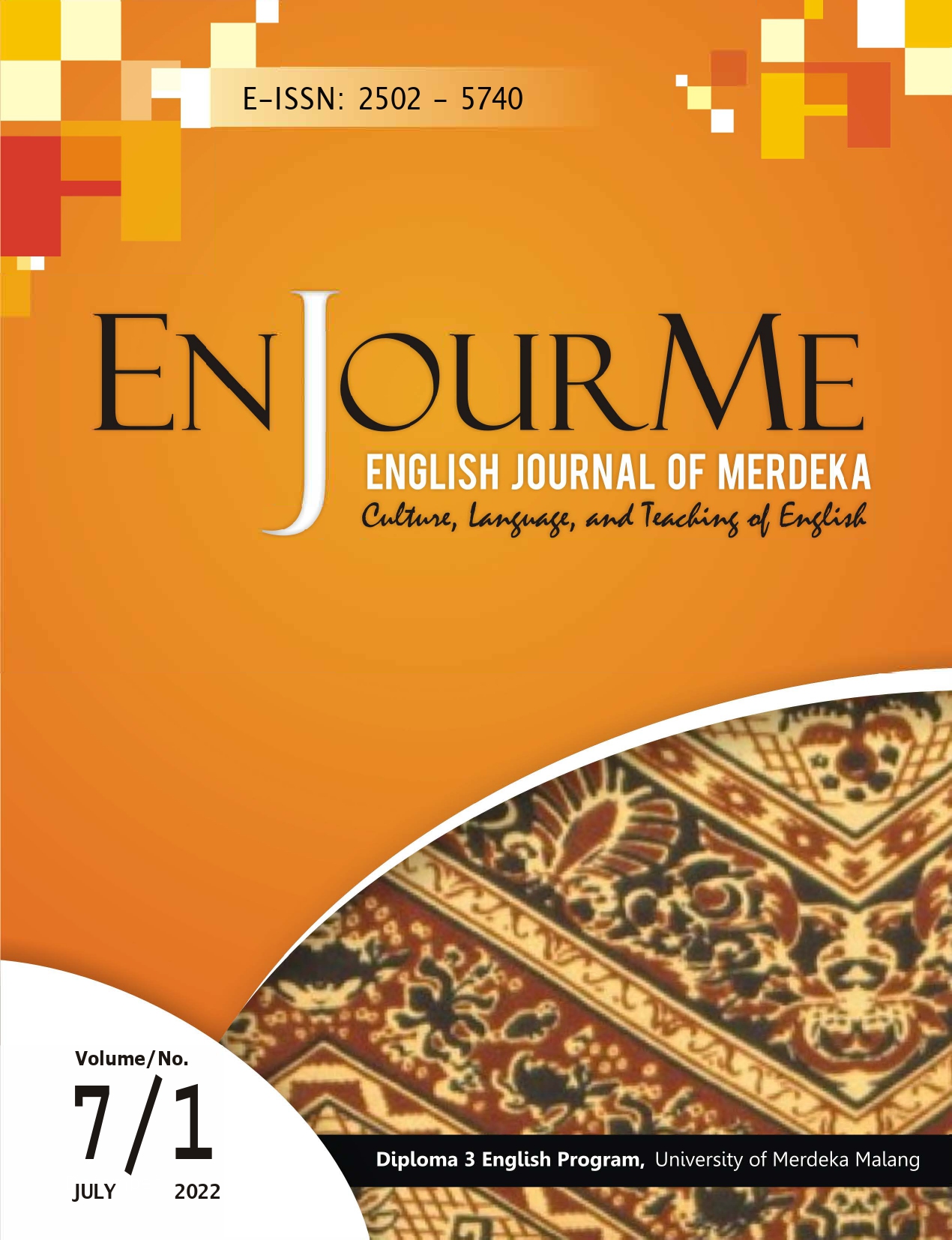Conceptions on authentic assessment: What Indonesian EFL teachers conceive
DOI:
https://doi.org/10.26905/enjourme.v7i1.7018Keywords:
authentic assessment, EFL teachers’ conceptions, feedbackAbstract
In Indonesian context, as the 2013 Curriculum (K-13) has been introduced to EFL teachers to be implemented at schools, performance-based assessment starts to be applied at schools too, accompanying the curriculum implementation. This educational reform is meant to improve the quality of the teaching of English as a foreign language. However, little is known in the body of knowledge on EFL teachers’ challenges in implementing the authentic performance-based assessment in K-13 context, one of which, it was argued, is a facet that derives from EFL teachers’ conception on matters pertaining to authentic assessment. To address this, a survey was conducted to find out EFL teachers’ conceptions about authentic assessment, the role of feedback, and use of authentic assessment procedures in the context of such K-13 educational reform. A number of EFL teachers at lower and upper secondary levels of education in East Java across seniority were involved in the present survey. The findings of the study reveal among other things interesting phenomena where contradictions of conceptions were observed on authentic assessment. These findings have pedagogical implications that are educationally beneficial for the proper and successful implementation of authentic assessment under the 2013 curriculum – K-13.
DOI:Â 10.26905/enjourme.v7i1.7018
Downloads
References
Arrafii, M. A. (2021). Indonesian teachers’ conceptions of values and dimensions of assessment practice: The effect of teachers’ characteristics. Teaching and Teacher Education, 98, 103245.
Azis, A. (2015). Conceptions and practices of assessment: A case of teachers representing improvement conception. Teflin Journal, 26 (2), 129-154.
Bachman, L. F. (1990). Fundamental considerations in language testing. Oxford university press.
Brown, H.D. (2004). Language assessment principles and classroom practice. San Francisco: Pearson Education Inc.
Decree of Ministry of Education Number 13 Year 2015 about National Standard of Education (downloaded from http://dispendik.surabaya.go.id on September 29th 2016)
Decree of Ministry of Education Number 104 Year 2014 about Assessment Standard (downloaded from http://dispendik.surabaya.go.id on September 29th 2016)
Fulcher, G. (2010). Practical language testing. London: Hodder Education.
Fulcher, G. and Davidson, F. (2012). The routledge handbook of language testing. New York: Routledge Taylor & Francis Books.
Harmer, J. (2009). The practice of English language teaching (4th ed.). Harlow: Longman
Hughes, S. (1993). What is alternative/authentic assessment and how does it impact special education?. Educational Horizons, 72(1), 28-35.
Isnawati, I, & Saukah, A. (2017). Teachers’ grading decision making. Teflin Journal, 28 (2), 155-169.
Nepsor, J. (1987). The role of beliefs in the practice of teaching. Journal of Curriculum Studies, 19(4), 317-328.
O’Malley, J.M., & Pierce, L.V. (1996). Authentic assessment for English language learners: Practical approaches for teachers. US: Addison-Wesley Publishing.
Pramastiwi, P., Lie, A., Widiati, S., & Lie, T. (2018). Challenges and resources in CPD for in-service teachers: Establishing communities of inquiry. Beyond Words, 6(2), 66-87.
Rizqi, M.A. (2017). Stress and resilience among EFL teachers: An interview study of an Indonesian junior high school teacher. Teflin Journal, 28 (1), 22-37.
Retnawati, H., Hadi, S., & Nugraha, A.C. (2016). Vocational high school teachers’ difficulties in implementing the assessment in curriculum 2013 in Yogyakarta province of Indonesia. International Journal of Instruction 9(1):33-48. DOI: 10.12973/iji.2016.914a
Sulistyo, G. H. (2015). EFL learning: Assessment at school. Malang, Bintang Sejahtera.
Additional Files
Published
How to Cite
Issue
Section
License
Authors who publish with this journal agree to the following terms:
(1) Copyright of the published articles will be transferred to the journal as the publisher of the manuscripts. Therefore, the author confirms that the copyright has been managed by the journal.
(2) Publisher of EnJourMe (English Journal of Merdeka) : Culture, Language, and Teaching of English is University of Merdeka Malang.
(3) The copyright follows Creative Commons Attribution–ShareAlike License (CC BY SA): This license allows to Share — copy and redistribute the material in any medium or format, Adapt — remix, transform, and build upon the material, for any purpose, even commercially.




